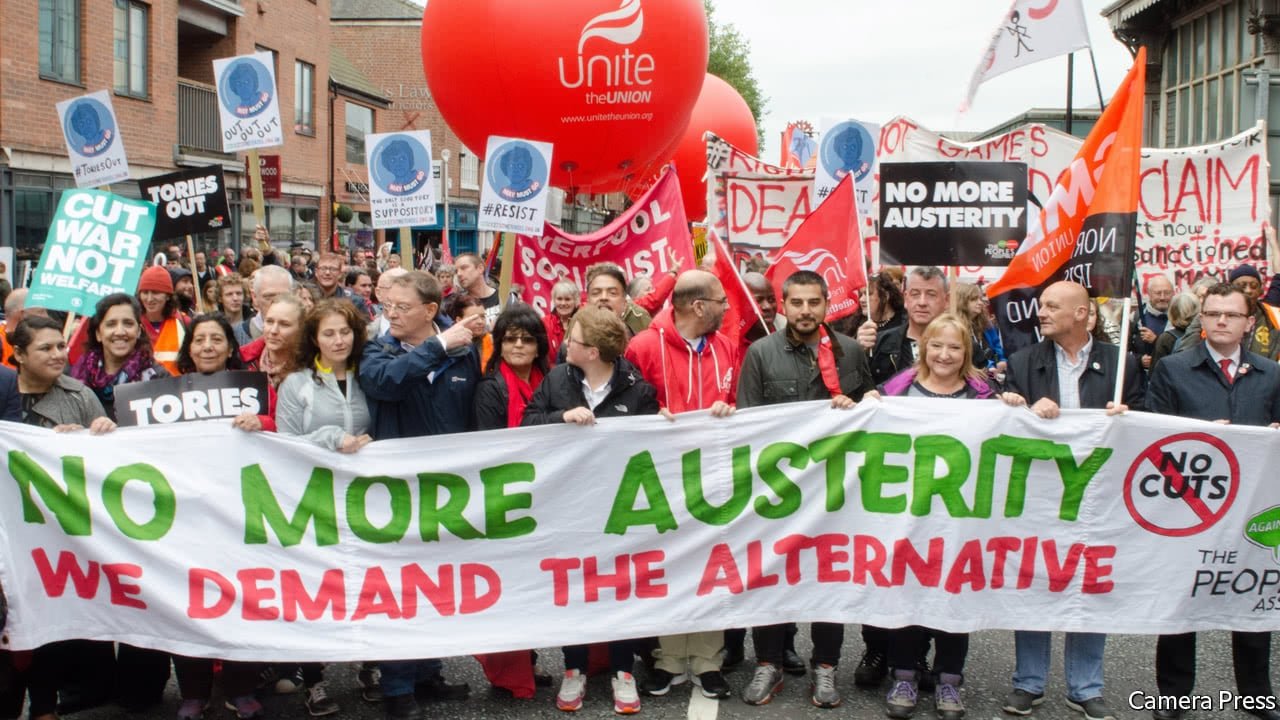By BAGEHOT | MANCHESTER
IF I had to sum up the Labour Party conference in Brighton last week in a single word, it would be “frightening”. A major British political party has been captured by a hard-left clique that has little respect for the basic principles of a liberal society. If I had to sum up the Conservative Party conference in a single word, it would be “dismal”.
The first thing I saw on arriving was a large army of angry demonstrators controlled by a smaller army of police, some with horses, a few with machine guns. One demonstrator greeted me with the refrain “fuck off Tory scum”. When I explained that I was a journalist he modified his greeting to “fuck off Tory media scum”. Several delegates were spattered with spit. It is a fact worth contemplating, particularly in discussions of online vitriol, that the only people who object to the very existence of their opponents, and are willing to express that objection in the form of sometimes violent protests, are on the left.
But inside the hall everything is calm to the point of blandness. The conference has been essentially contracted out to corporations, lobbyists, PR people and career politicians. The convention centre is dominated by corporate booths: the Philip Morris booth (“designing a smoke free future”); the National Union of Farmworkers booth; the Microsoft and Google booths; and lots of booths selling suits, shirts, historical Conservative posters, books and Christian chocolate. PR people ply you with notebooks, pens and other samples. When I listened to Philip Hammond’s (rather good) address to the conference on the importance of defending capitalism from its critics I noticed that the row in front of me was taken up with people wearing “Aston Martin” logos on their backs. In Brighton the atmosphere was electric with enthusiasm. In Manchester it is limp with boredom.
The reason for this is simple: conferences don’t actually matter. Once upon a time conferences actually made binding decisions. In 1950 the Tory Party leadership was forced to commit itself to building 300,000 new houses after a series of rebellions on the conference floor. The 1951 conference included a passage that the current Tory leadership would do well to learn by heart:
Housing is the first of the social services. It is also one of the keys to increased productivity. Work, family life, health and education are all undermined by crowded houses. Therefore a Conservative and Unionist Government will give housing a priority second only to national defense.
Today conferences are nothing more than back-drops for speeches by well-known politicians: stuffed shirts making predictable announcements to a hall full of OAPs (who turn up out of habit) and PR people who are bused (or Land-Rovered) in to bulk out the audience.
Not everything is lost. Some of the fringe events are genuinely interesting. The brightest Conservatives are trying hard to understand why they made such a hash of the last election and why young voters are fleeing. The threat of Mr Corbyn is beginning to galvanise opinion: Iain Martin, a columnist for the Times and editor of Reaction, a right-leaning website, argued that for the first time in years, after a long era when politics has been dominated by inter-changeable professionals from the middle of the political spectrum, there is something genuinely worth fighting about. There is a growing sense that things can’t go on as they are: the Conservatives either have to up their game dramatically or surrender to a government that is committed to undoing everything they have worked for the last few decades.
Upping the ante might start with the Conservative Party conference itself: this bought-and-paid for Potemkin event can only play into Mr Corbyn’s hands. The Conservative Party needs to reduce the cost of the conference so that ordinary foot soldiers such as local councillors can afford to attend. It needs to corral the PR people into their own corners rather than allowing them to take over the entire event. And it needs to give the delegates some power so that they can hold the people on the stage accountable.








